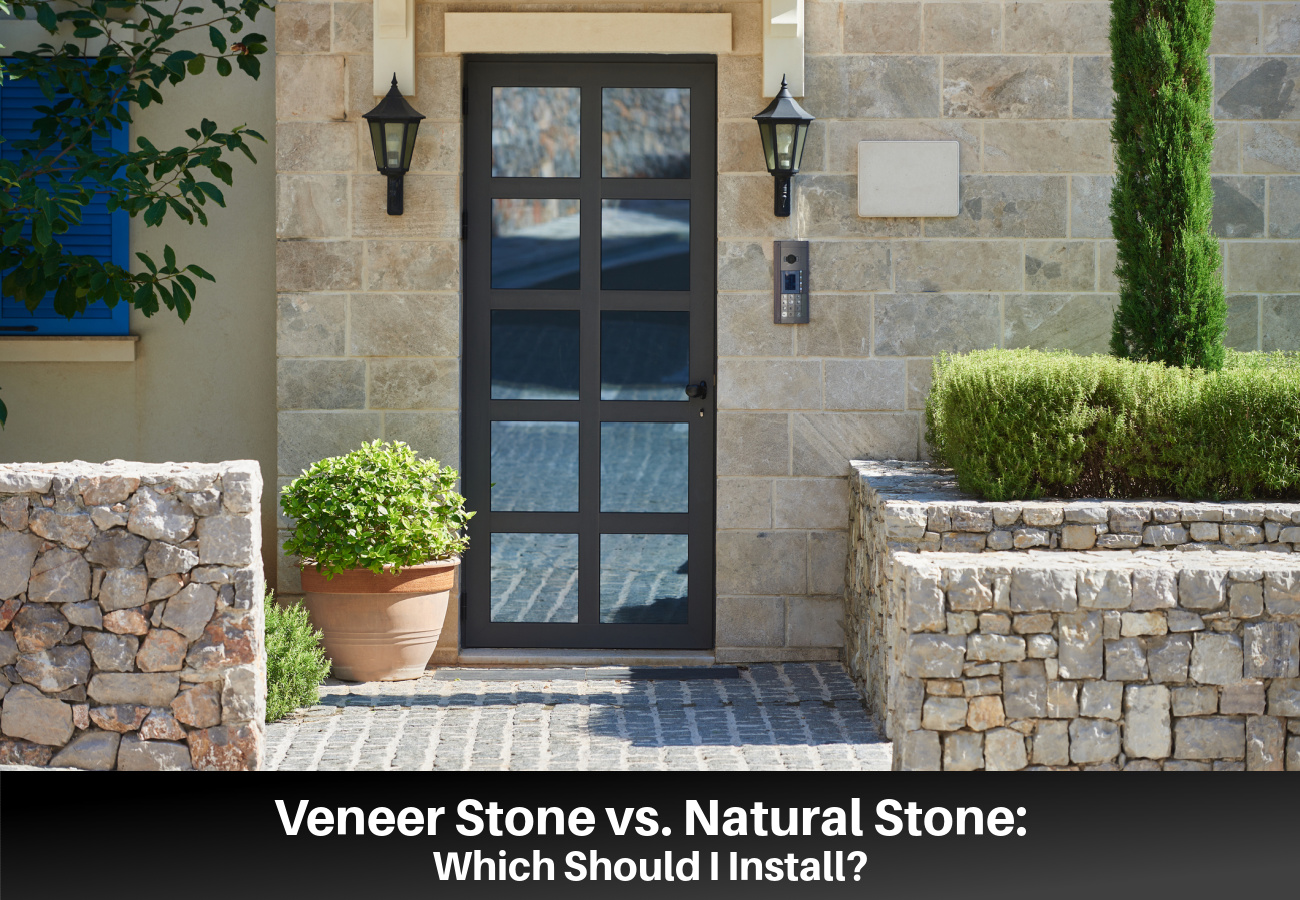There are lots of considerations when choosing between veneer stone and natural stone. Stonework exhibits a striking display of craftsmanship.
It enhances a home’s exterior and is suitable for patios, walkways, or facades. Choosing the ideal type of stone depends on your design needs and preferences.

Natural Stone at a Glance
Natural stone forms in the earth’s crust after undergoing heat and pressure for thousands of years. The process involves pressing together sand and minerals to form the stone. The most common minerals that make up natural stone include quartz, feldspar, and mica.
There are various types of natural stone. They include granite, marble, limestone, travertine, sandstone, and slate. Each type of stone has a different hardness level. Before choosing a type of natural stone, you should compare its hardness on the Mohs Hardness Scale.
Pros and Cons of Natural Stone
Pros:
- Low maintenance needs
- Unique and authentic appearance
- Strong, durable, and high resistance
Cons:
Veneer Stone at a Glance
Veneer stone is a manufactured product designed to mimic the appearance of natural stone. The main components of veneer stone include cement, iron oxide, and aggregates. They undergo molding and coloring to create a final product that resembles natural stone.
Pros and Cons of Veneer Stone
Pros:
- Lightweight
- Easier to cut and shape
- Cheaper materials and installation than natural stone
- Manufactured stone veneers offer uniform style and color
Cons:
- Prone to chipping and color fading
- Not strong enough to be used structurally for building applications
Veneer Stone vs. Natural Stone: Top Differences

Cost Comparison
The cost comparison between natural and veneer stone is further classified into installation, maintenance, and material cost.
- Material Cost: Veneer stone is cheaper than natural stone due to the easier production process. The cost of natural stone is a cumulative figure that encompasses quarrying, extraction, cutting, and transporting costs.
- Installation Cost: Natural stone installation costs are higher than veneer stone because they’re heavy. Installation requires specialized equipment and skilled labor, increasing the project’s total cost. Veneer stone is lighter and easier to install, making it ideal for projects on a tight budget.
- Maintenance Cost: Veneer stone requires regular sealing and cleaning due to its porous nature. You must consider maintenance costs to prevent staining and water damage. Natural stone is less porous and requires less maintenance over time.
Maintenance Requirements
Natural stone needs less maintenance than veneer stone. It’s less porous and doesn’t need sealing. Veneer stone is more absorbent. It requires regular sealing to prevent staining and water damage.
Durability
Natural stone boasts more durability and resistance than veneer stone. Natural stone undergoes years of composition and formation process. The process renders it solid and durable.
Natural stone withstands heavy foot traffic and extreme weather conditions. Veneer stone is a manufactured product designed to be lightweight. As a result, it’s less rigid and durable than natural stone.
Aesthetics
Natural stone has a unique and varied texture that forms through its natural formation process. A natural stone’s texture ranges from smooth to rough depending on the type of stone and the quarry’s location. Veneer stone lacks the same depth and variation since it mimics the texture of natural stone.
Natural stone is available in white, beige, gray, brown, black, and red. The color depends on the minerals present and the quarry’s location. Veneer stone is also available in various colors. Veneer stone, however, has a more uniform color and is less varied than natural stone.
Weight and Thickness
Natural stone is thicker than veneer stone, making it more suitable for load-bearing applications. Veneer stone is much thinner, lighter, and unsuitable to support weight. It’s ideal for use on interior walls.
The lightweight nature of veneer stone makes it easier to handle and install. Natural stone is heavy and requires specialized equipment and skilled labor to install.
Installation Criteria
Natural stone requires masonry techniques for installation. It involves laying stones in a specific pattern and filling the joints with mortar. The method provides a strong and stable foundation for the structure.
Veneer stone, on the other hand, uses an adhesive for installation. The installation method makes it insufficient for structure weight support. Natural stone is heavy and needs specialized equipment and skilled labor for installation.
Veneer stone is lighter and does not require heavy machinery for installation. Natural stone requires specialized tools for cutting. Cutting veneer stone requires a saw or snip, which makes it ideal for DIY projects.
Availability
Veneer stone is available at most home improvement stores. Natural stone is more difficult to source and requires placing a specific order.
Structural Application
Natural stone is solid enough to support the weight of a structure. It’s ideal for load-bearing walls and other structural applications.
Veneer stone isn’t strong enough to support the weight of a structure. Veneer is ideal for decorative purposes. Installing veneer stone on drywall, plywood, or sheathing is easy.
Frequently Asked Questions (FAQ)FAQ
Should you choose natural stone or veneer stone for your home’s exterior?
Natural stones are rugged and have a high resistance to weather conditions. They’re more suitable for exterior walls than veneer stone. Natural stone is also less porous, making it less prone to deterioration over time. Limestone is used for exterior siding in homes due to its attractive appearance and durability.
What is the most durable type of natural stone?
Granite is a durable hardscape material with a low absorption rate and high fire and heat resistance. It’s rated 6 or 7 out of 10 on the Mohs Hardness Scale, making it a popular choice for outdoor spaces.
Can veneer stone be used in outdoor applications?
Veneer stone is best for outdoor applications that need extra support. Manufactured stone veneer siding is lightweight and unsuitable for load-bearing applications. It’s suitable for various applications such as facades, retaining walls, outdoor fireplaces, and accent walls.


